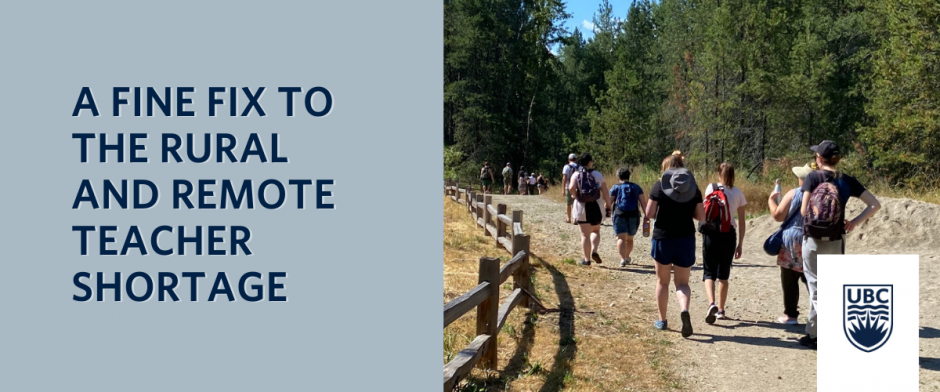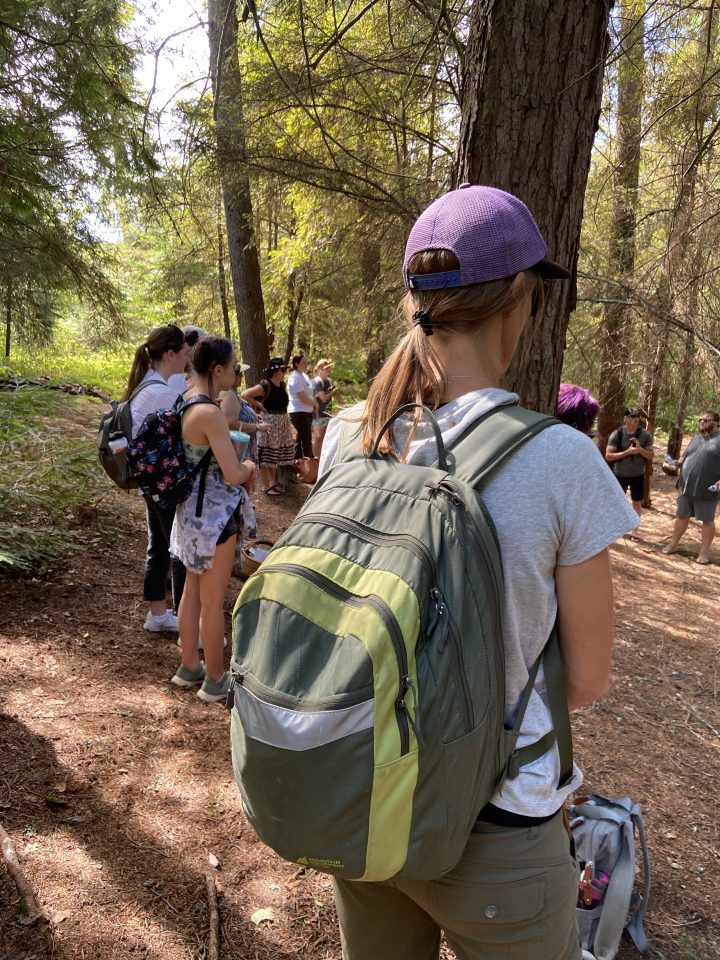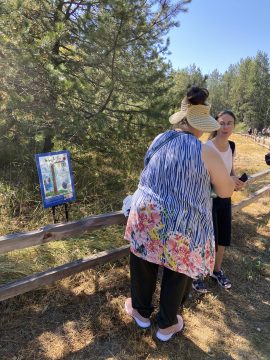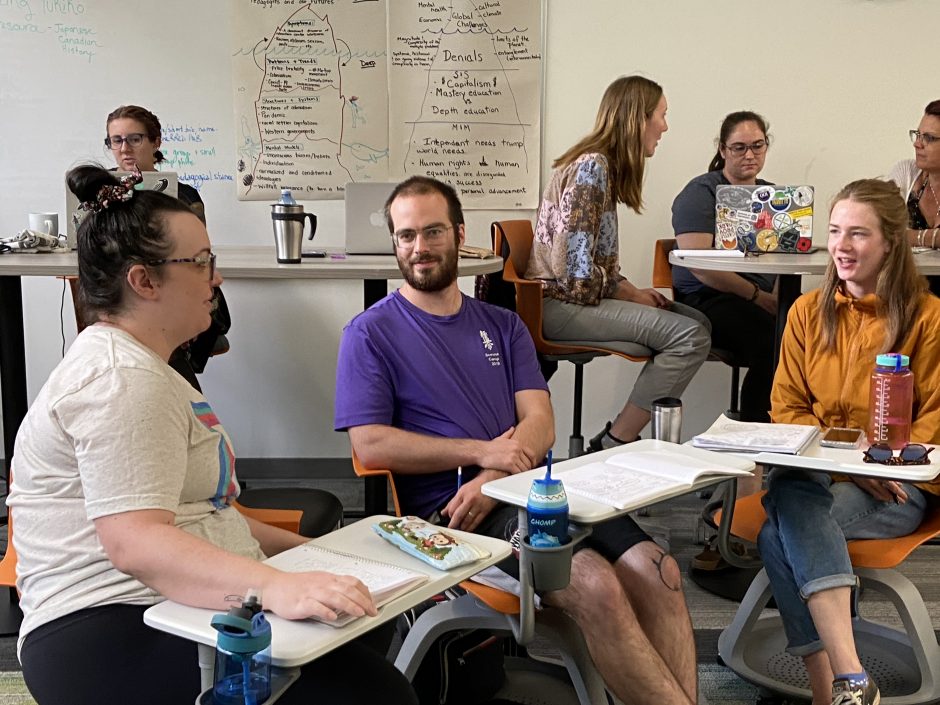
From Vanderhoof to Arrow Park and from Tache to Kitimat, the 25 teacher candidates in UBC’s first rural and remote teacher education (RRED) program are firmly rooted and committed to their rural communities, and at the same time, immersed in high quality blended learning. The RRED program is innovatively meeting the strong need for well-trained teachers in remote and rural places throughout BC through a flexible and accessible online and in-person hybrid structure.
The 2022-2024 RRED cohort is now one quarter through their studies, and teacher candidates continue to observe how critical this program is to meet their educational needs and the needs of their communities. “Rural communities need teachers and RRED is the best way for teacher candidates from remote areas to get access to teacher education,” says a teacher candidate in northern BC.
Seven teacher candidates in the program serve as uncertified teachers on Letters of Permission (LoPs) while simultaneously completing their BEd and working towards teacher certification. RRED teacher candidates are vital to address the acute teacher shortage in rural and remote communities.
Rural and remote teacher candidates serve communities across BC
My community is in desperate need of teachers, so the program has allowed RRED students to stay in communities where they are needed while helping them achieve [their] education to ‘officially’ take on their roles.
– RRED student currently on an LoP
Another teacher candidate on an LoP observes that “communities get the teachers they need that are committed to place and the people who live there.”
Six RRED students are currently working as education assistants and two as Indigenous support workers in rural and remote schools, so the cohort community brings their wealth of inclusion, equity and diversity experience and background knowledge to the cohort’s BEd learning.

The importance of Land-based learning in the summer residency and Indigenous worldviews integrated throughout the year are core aspects of the RRED program’s intentional anti-colonial structure and design. A southern BC teacher candidate says, “I have appreciated the decolonial lens that each prof has taken thus far. They start each class with a territorial acknowledgement, as well as a learning intention. It has helped me to centre an Indigenous lens in all my learning.” The decolonial design of the program is critical to inclusively address diversity, so needed in education everywhere, and in rural places. The RRED program is iterated continuously with input from the teacher candidates, instructors, and UBC leaders. Unlearning colonial practices and structures and relearning pedagogy and assessment for equity are core underpinnings.
Each term, teacher candidates reflect on and share their emerging pedagogical stance with their cohort “frolleagues” and guests in circle. The learning is authentic as teacher candidates consider deeply who they are becoming as teachers and give evidence and examples that underpin their growing teaching identity. As a northern BC teacher candidate says, “I am unlearning, and threads are being removed, and learning, having new, brighter threads being woven in. The threads weave together my identity and my pedagogy in new and more beautiful ways each week.”
Another teacher candidate from the north speaks of the calibre of inclusion, equity and diversity scholarship and expertise in the RRED instructional team, “It’s exciting to meet the leading education experts in these areas and learn from and with them.” Significantly, the RRED program design ensures that rural and remote teacher candidates have quality teaching and learning to inform their important work as K-12 teachers in the field, while building on their strengths and knowledges of community.
A big part of the “fix” for the rural teacher shortage is that RRED supports teacher candidates to stay in their rural communities. They are already invested in their communities and committed to stay. They study online during the year and gather in person as a learning community in a month-long summer residency at the UBC Learning Centre in Nelson each year. This flexible and accessible structure allows prospective teachers to “make an education degree …a reality for people who choose to call rural places home…practical for anyone who has kids, jobs, or any other obligations (a life),” as a rural teacher candidate from the Kootenays observes.
The way the program is structured currently is really the only way I could have made this work right now with work and family.
– A teacher candidate from Vancouver Island speaks from the perspective of a young parent

With all the challenges rural and remote communities face, RRED is making a significant contribution to increasing quality teacher education in places where these needs are most profound.

The annual summer institute is also lauded by RRED teacher candidates as a crucial part of their learning and professional collaborative practice. A northern teacher candidate says, “We are a diverse group that has come from different experiences, fields of study and interests and when we come together, the learning is real, authentic, and rewarding.”
Meeting learners where they are is the hallmark of creating an inclusive and successful learning community. RRED is proving to not only meet rural and remote teacher candidates where they are geographically in beautiful far-flung places across the province, but also pedagogically through inclusive, decolonial, and reflective teacher education. In turn, these teacher candidates are well along in their journey to inspire their student learners with the passion for pedagogy that UBC’s Rural and Remote Teacher Education Program has cultivated. It’s a fine fix for making a difference in rural and remote communities over the long term.
For more information about the RRED program, please contact:
Terry Taylor, RRED Pedagogical Lead or
Graham Setters, RRED Program Manager